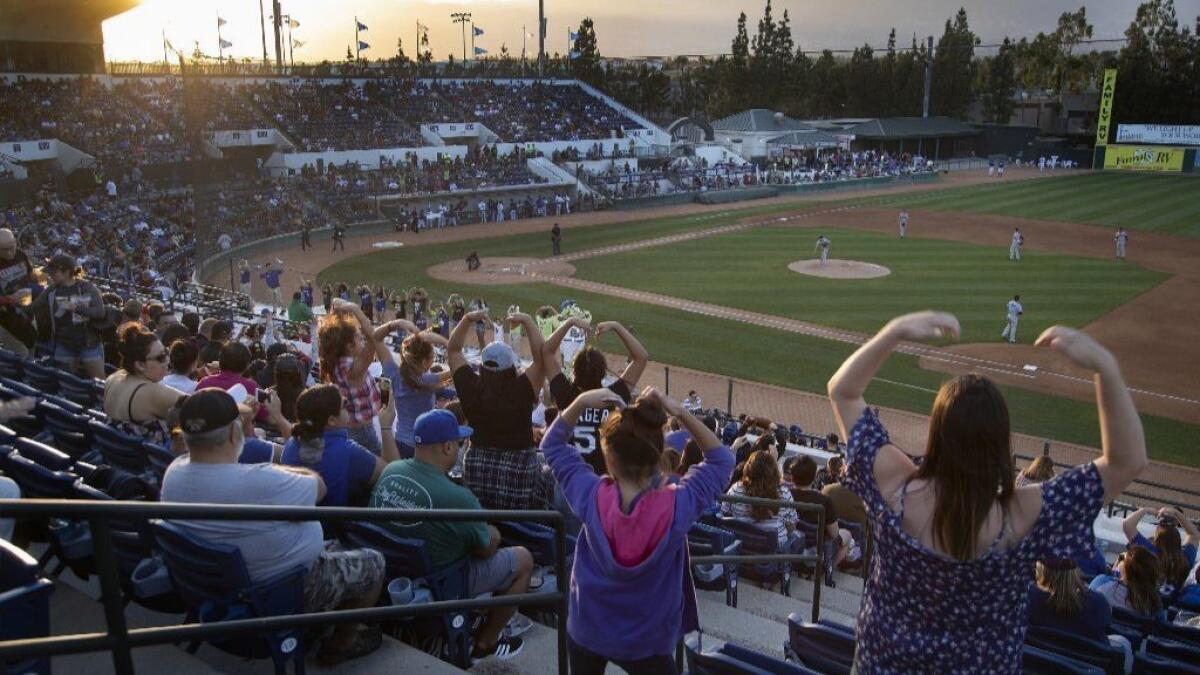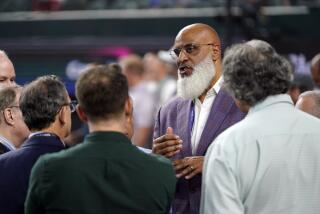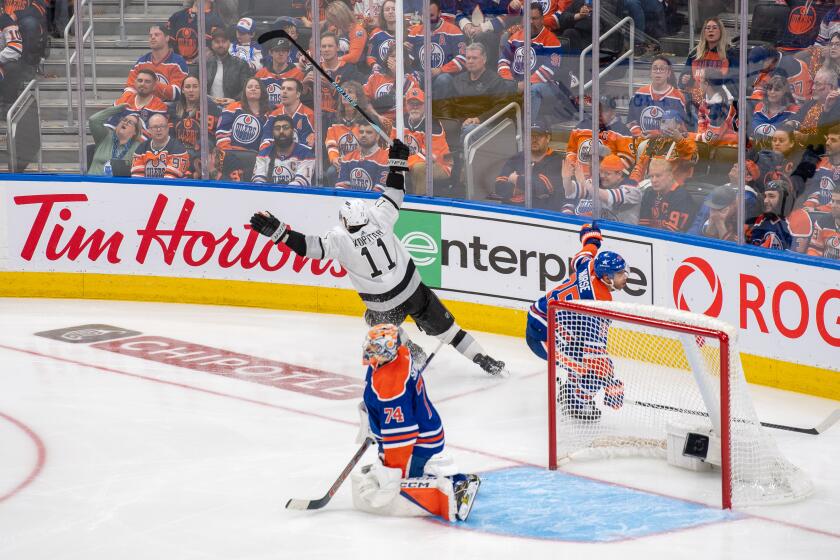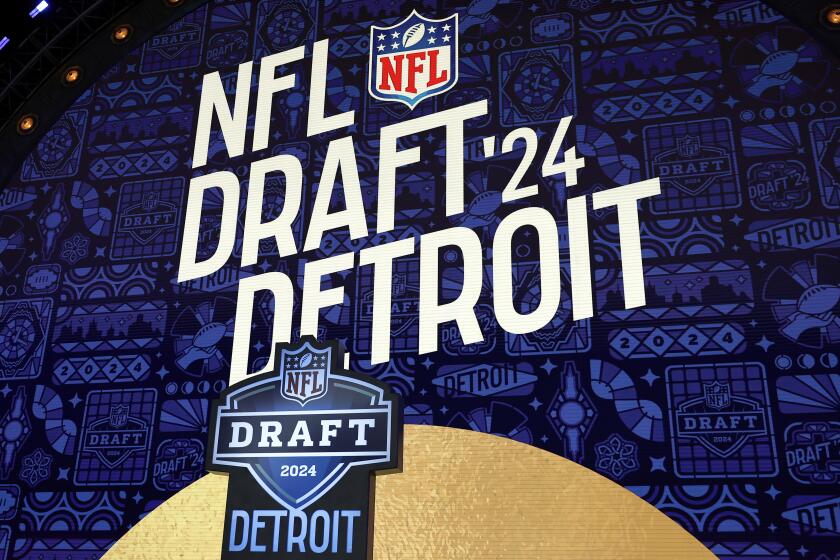Column: Minor league baseball players exploring union as they continue to battle low wages

“Chilly” might be an understatement. Relations between major league owners and the players’ union have deteriorated to the point where you can almost imagine a pay-per-view fight card: “MLB vs. MLBPA, coming in 2021!”
There could be an undercard too. The absurdly low salaries paid to minor league players could trigger some sort of action before then — in the courts, in state legislatures, in a union-organizing drive, or in meetings among the owners.
The issue already is in the courts, in a suit filed four years ago that demands that major league owners pay their minor leaguers according to minimum wage laws. The owners responded by successfully lobbying for a federal law that guarantees minor leaguers the minimum wage — but only for a 40-hour workweek during the season. No pay for a sixth or seventh game in a week, for spring training, for the off-season.
The legislation has aggravated a core of minor league players enough to explore whether a union might be feasible.
The maximum monthly wage for first-year players is $1,100.
In triple-A, the highest level of minor league baseball, the minimum salary is $10,750 per year. At the highest level of minor league hockey, where players are represented by a union, the minimum salary is $47,500.
Larry Landon, the executive director of the Professional Hockey Players Assn., said he has taken numerous calls from minor league baseball players interested in learning whether the PHPA model could work in baseball.
“I personally think it’s incumbent upon the major league players to really try and help their brethren at the minor league level,” Landon said.
There is no shortage of sympathy among the major league players. But, they say, it is not as simple as welcoming minor leaguers into the major league union.
“In terms of the minor league guys, we try to do as much as we possibly can for them, but obviously it’s a major league union at this point,” said Colorado Rockies catcher Chris Iannetta, a member of the MLBPA executive board. “That’s what we focus on. It’s not like we leave them out. We try to set them up so that, when they come to this level, they’re in the best position possible.”
Said Cleveland Indians pitcher Andrew Miller, another executive board member: “It’s certainly not something we’re blind to. I’ve seen five guys live in an apartment for $800 a month.
“It’s definitely a touchy subject. It’s not a lot of money that they’re asked to survive on, in pretty tough places. A lot of people that are playing minor league baseball aren’t coming from much. They’re not using it as an apprenticeship. They’re trying to take care of people back home.”
Tony Clark, executive director of the MLBPA and a former major leaguer himself, said the union is supportive of the minor leaguers, and of a better wage for them. He said the executive board never has formally considered a proposal to represent the minor leaguers.
“In negotiations, everything is essentially traded dollar for dollar,” Miller said. “There might be a possibility for us to pressure the MLB side to raise wages on the minor league side. However, we would probably be sacrificing, say, arbitration, or some sort of dollars that are being spent on us elsewhere. That is just the reality of the deal.”
This, too, is reality: The MLBPA derives its negotiating leverage from the unique abilities of its members, and the threat of a strike. Major leaguers are not going to strike to protect rookie league players, almost all of whom will never see the majors and could easily be replaced by players from independent leagues.
However, the MLBPA has quietly encouraged groups that might be interested in representing minor leaguers. Landon, who runs the minor league hockey union, said his group probably would not be interested.
Better, he said, for the minor leaguers to align with a much larger union, one with the resources necessary to conduct a potential drive to organize the thousands of players on minor league teams in the United States, Canada and the Dominican Republic.
“One of the unions that supports and delivers product into the minor league playing fields would love to have minor league baseball players,” Landon said. “It’s sexy. And they have muscle.”
The MLBPA has 1,200 members. The United Steelworkers has 850,000 members, in a variety of industries.
The USW has been contacted by “dozens” of minor league players, said director of organizing Maria Somma.
“Our union is supportive of anybody who wants to organize or work collectively to try to get some employers to address their issues, which would include minor league baseball players,” Somma said.
“It doesn’t mean that we’re engaged in a full-fledged organizing drive. It doesn’t mean we’re seeking to do representation. What it does mean is that we want to engage with workers in figuring out strategies with which we can help them.”
The bottom line is this: The legislation intended to end the minor league wage debate has instead accelerated it, toward a tipping point where some sort of do-over appears inevitable.
The lawsuit filed four years ago still is alive. The law is not retroactive, so owners might still be liable for back pay. And, because states have the right to require wages higher than the minimums established in the federal law, the possibility exists that minor league players in the Class-A California League could be entitled to a higher salary than players in the double-A Texas League.
It would be incredibly difficult to organize all the minor league players. Job security in the minor leagues is tenuous enough without a player risking retribution for trying to organize a union— – not just in one workplace, but in some 250 clubhouses across three countries.
But that task could be less imposing if organizers started in a labor-friendly state like California — or in Arizona, where half the clubs hold spring training. State-by-state pay rates would be an administrative nightmare for owners.
Major League Baseball declined to comment for this column.
Owners could say they would be happy to consider a solution that does not increase their costs. They could pay more in minor league salaries and less in signing bonuses, but that is not the fight they ought to pick with agents, not with a potential major league labor war looming. The owners could pay more in minor league salaries by cutting minor league teams and thus offering fewer jobs, but that is not a fight they ought to pick with cities where taxpayers funded minor league ballparks.
No, the owners are slowly becoming aware they ought to resolve the matter, because it is the right thing to do, or because the relentlessly negative publicity over poverty wages in an industry that generates $12 billion per year could be mitigated with a relatively small contribution.
The Dodgers run one of baseball’s most extensive minor league systems. They list about 300 organizational players in their media guide, so guaranteeing each one $25,000 this year would have cost less than they guaranteed to infielder Logan Forsythe this season.
The agreement that governs the relationship between the major leagues and the minor leagues expires in 2020. As the two sides negotiate a new deal, major league owners are expected to get a better sense of what a revised minor league salary structure might look like, and how to pay for it.
“Many owners would like to address this issue in the near term,” said a baseball official not authorized to speak publicly on the issue.
That would avoid a scene like the one at the winter meetings in 2016, where Dylan Cozens of the Philadelphia Phillies was honored as the year’s minor league home run king. In accepting his award, he told the ballroom crowd that he had made more in his $8,000 prize that day than he had made in salary that season.
Follow Bill Shaikin on Twitter @BillShaikin
More to Read
Get our high school sports newsletter
Prep Rally is devoted to the SoCal high school sports experience, bringing you scores, stories and a behind-the-scenes look at what makes prep sports so popular.
You may occasionally receive promotional content from the Los Angeles Times.







